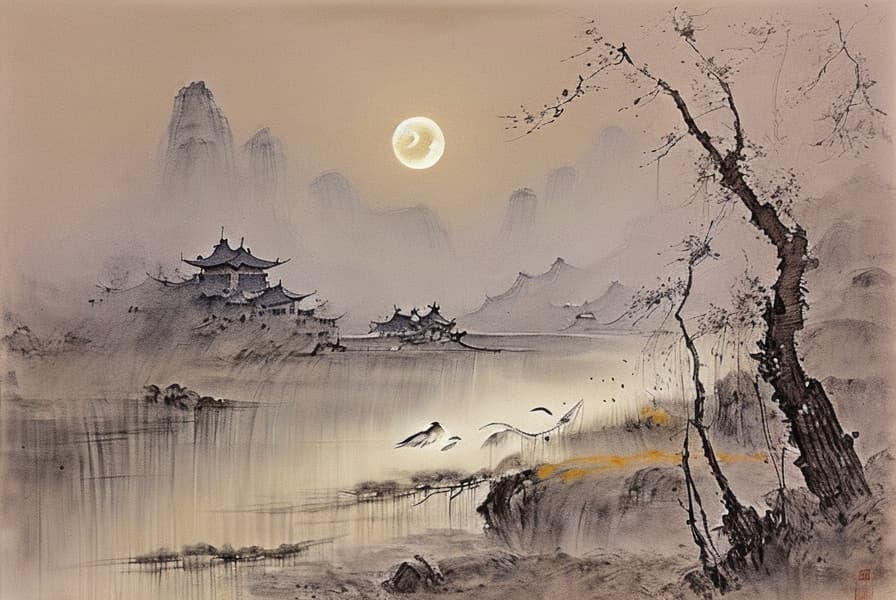Hard to see you
- Poetry of Li Shangyin

相见时难别亦难,东风无力百花残。
春蚕到死丝方尽,蜡炬成灰泪始干。
晓镜但愁云鬓改,夜吟应觉月光寒。
蓬山此去无多路,青鸟殷勤为探看。
Time was long before I met her, but is longer since we parted,
And the east wind has arisen and a hundred flowers are gone,
And the silk-worms of spring will weave until they die
And every night the candles will weep their wicks away.
Mornings in her mirror she sees her hair-cloud changing,
Yet she dares the chill of moonlight with her evening song.
...It is not so very far to her Enchanted Mountain
O blue-birds, be listening!-Bring me what she says!
Seven-character-regular-verse
Li Shangyin was a complex poet whose writing consisted of mysterious yet elegant references to nature and inanimate objects. In this particular poem that purposely remains untitled, Li alludes to a forbidden love affair that tugs on the heartstrings of his audience. The first seven words evoke a sense of inescapable sadness: even when the lovers manage to meet each other, they feel a sense of impending doom at the thought of their eventual departures.
The next few lines portray Li’s cunning ability to weave together nature and romance. The feeble East wind and the shriveled flowers depict the ill conditions of the two lovers; because each encounter between them is filled with an atmosphere of melancholy, they are unable to fully enjoy the passions of their love affair and are slowly crippling from a fear of impending doom that lies within their minds. The image of a silkworm that works itself to death and a candle that is consumed by its own tears further the idea of the lover’s consuming passion for his beloved. The demise of the silkworm and the melting of the candle confirm the tragic underpinnings of this poem.
Moreover, the juxtaposition between 晓 (morning) and 夜 (night) demonstrates that throughout the entirety of the day, the lover undergoes despair, whether it be watching his black hair turning white in the morning, or solemnly weeping to the moon at night. The last two phrases allude to mystical objects: 蓬山 is a mythical mountain where fairies reside, while 青鸟 is the blue bird that acts as a messenger for the queen that resides in the Fairy Mountain. Ultimately, the lover convinces himself that he will remain in close contact with his beloved due to the constant messages they send to each other through the blue bird.
- Why Chinese poems is so special?
- The most distinctive features of Chinese poetry are: concision- many poems are only four lines, and few are much longer than eight; ambiguity- number, tense and parts of speech are often undetermined, creating particularly rich interpretative possibilities; and structure- most poems follow quite strict formal patterns which have beauty in themselves as well as highlighting meaningful contrasts.
- How to read a Chinese poem?
- Like an English poem, but more so. Everything is there for a reason, so try to find that reason. Think about all the possible connotations, and be aware of the different possibilities of number and tense. Look for contrasts: within lines, between the lines of each couplet and between successive couplets. Above all, don't worry about what the poet meant- find your meaning.
List of Chinese poets
Pre-Qin Poetry
Han poetry
Ban Gu Cao Cao Cao Zhi Cao Pi Cai Wenji Kong Rong Liu Bang Liu Che Qin Jia Ruan Ji Su Wu Wang Can Xiang Yu Xu Gan Zhang Heng AnonymousSix Dynasties Poetry
Tao Yuanming Zhang HuaTang poetry
Bai Juyi Bao Junhui Cen Shen Chen Zi'ang Cui Hao Chang Jian Cui Tu Chen Tao Du Fu Du Mu Du Shenyan Dai Shulun Du Xunhe Du Qiuniang Gao Shi Gu Kuang Gao Pian Han Yu He Zhizhang Han Hong Huangfu Ran Han Wo Huang Chao Jia Dao Jiaoran Jin Changzu Li Bai (Li Po) Li He Li Shangyin Liu Yuxi Liu Zongyuan Luo Binwang Li Qi Liu Changqing Lu Lun Li Shen Li Yu Li Qiao Li Yi Liu Fangping Liu Zhongyong Li Ye Meng Haoran Meng Jiao Ma Dai Pei Di Qian Qi Quan Deyu Sikong Shu Song Zhiwen Shen Quanqi Shangguan Wan'er Xuanzong of Tang Wang Bo Wang Changling Wang Wei Wang Zhihuan Wei Yingwu Wen Tingyun Wang Han Wei Zhuang Wang Wan Xue Tao Xu Hun Xu Hui Yuan Zhen Yu Xuanji Yu Shinan Yuan Jie Zhang Jiuling Zhang Ji Zhang Hu Zhang Zhihe Zu Yong Zhang Xu Zhu Qingyu Zheng Tian Zhang Bi Zhang RuoxuSong Poetry
Cai Xiang Chao Chongzhi Fan Chengda Fan Zhongyan Huang Tingjian He Zhu Kou Zhun Jiang Kui Lu You Li Qingzhao Liu Yong Mei Yaochen Ouyang Xiu Pan Lang Qin Guan Qian Weiyan Su Shi Su Zhe Song Qi Wang Anshi Wen Tianxiang Weng Juan Xin Qiji Yang Wanli Yue Fei Yan Jidao Yan Shu Ye Shaoweng Zeng Gong Zhang Xian Zhou Bangyan Zhu Shuzhen Zhu Xi Zhou DunyiYuan poetry
Bai Pu Guan Hanqing Ma Zhiyuan Xu Zaisi Yang WeizhenMing poetry
Chen Jiru Tang Yin Tang Xianzu Xu Wei Yu Qian Yang ShenQing poetry
Cao Xueqin He Shuangqing Nalan Xingde Pu Songling Tsangyang Gyatso Wang Guowei Yuan Mei Zheng Xie Zhao Yi